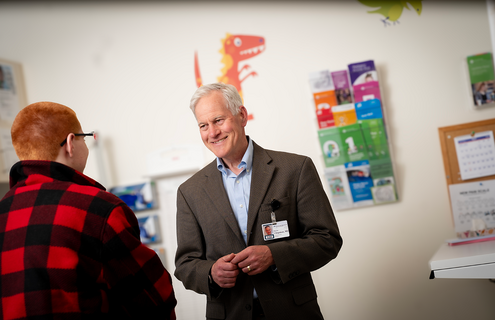
Gun injuries are now the leading cause of death for children and teens one to 17 years old.
“There’s no one on the planet who thinks that’s a good thing,” says Steven H. Chapman, MD, a pediatrician at Dartmouth Health Children’s. “We all want to keep our kids safe.”
“There are a lot of things that we can agree on. One of those is keeping firearms away from children who could use them mistakenly or unintentionally,” says James E. Esdon, program coordinator of Dartmouth Health Children’s Injury Prevention Center.
Together with Dartmouth Health providers and pediatricians, Esdon and Chapman are encouraging parents to use gun locks and start conversations that reduce the threat of unlocked firearms.
Where to begin
The good news, say Esdon and Chapman, is there’s no debate about protecting children and teens from being injured or killed by firearms. That makes for common ground to seed conversations about gun safety, they say.
“Gun owners and non-gun owners alike agree,” says Esdon, a firearms instructor who also works part-time for a local police department doing firearms training. “We all want to protect children.”
But both Esdon and Chapman also agree that talking about guns, parent-to-parent or parent-to-child, can feel awkward for some.
If you or someone you know owns a gun, you should always:
- Keep guns unloaded in the home.
- Keep guns out of sight and reach of children
- Keep guns securely locked up. New Hampshire State law requires firearms to be kept safely stored.
- Vermont's Secure Storage Law requires gun owners to store firearms in a locked container or equip them with a safety device whenever a child or “prohibited person” is likely to gain access to them.
- Equip guns with trigger locks and other childproof devices
- Keep ammunition locked up and away from guns and sources of heat and electricity
- Make sure guns are unloaded before you handle them
- Keep the muzzle pointed in a safe direction when you are handling a gun
- Take personal, long-term responsibility for your children’s supervision as well as for their ongoing education about gun safety
How pediatricians talk to parents
In his own practice, Chapman does not shy away from addressing gun safety head on with parents, just as he would bike helmets or seatbelts.
“We all have a role to play in keeping kids safe. A gun in the home generally does not make it safer for kids. What we’re worried about is an accident or injury or something tragic happening. So we ask parents how do you store guns and if you have them, is that something you would like help with?”
For those who have firearms, Chapman asks if they store the ammunition separately and whether they have a lock combination that the kids don’t know. If they don’t have a gunlock, he invites parents to get one through Dartmouth Health Children’s gunlock program that offers gunlocks free of charge.
How to talk parent-to-parent
When it comes to talking parent-to-parent when a child goes to another child’s home, Chapman also advises parents to focus the conversation on keeping kids safe.
“It’s important to couch it in the larger conversation around safety. Just as we ask what adults are going to be there, whether there are large cats or dogs for kids with allergies, we can ask if there are guns in the house and if so, how they are stored and whether kids have access.”
“You might introduce the topic by stating how happy you are that the kids are getting together and you want to be sure they are safe,” he says. He also suggests that if kids are coming over to your house, you can offer up to the parent whether you have a gun without being asked, and if you do, how you keep kids from getting access to it.
You might, for example, say: ’We do have guns in the house but they’re locked and the ammunition is stored separately so there’s no safety issues.’ That can normalize the conversation, says Chapman.
The conversation might feel awkward at first, but making sure it comes from a place of love for your kids will help. It’s also okay to admit to feeling uncomfortable, while stressing that the children’s safety is important to you, as is your children’s friendship.
How to talk to kids about guns
Chapman and Esdon say conversations depend on the age of the child.
Chapman likes to open a conversation with his patients in a way that makes children feel at ease. For younger kids, he tells them that if they ever see a gun to tell a grown-up right away and not to touch or pick it up because guns can be dangerous.
Chapman and Esdon recommend similar talking points to parents with young children.
“You might find it helpful to add that guns can sometimes be scary and confusing. You can also remind them that you are always there if they have questions or worries. Then build on that conversation as they get older,” he says.
For teenagers, make the conversation even more of a dialogue and be patient as you wait for them to respond. Do not be afraid to circle back or revisit the conversation.
Questions you ask might include:
- Do you know anyone who has a gun?
- Are guns something you are worried about or have encountered?
- Are guns a part of your life in any way that you want to talk about with me?
Always remind children, too, that you are there if they need you.
More information
For parents looking for more information on how to talk about gun safety, Esdon and Chapman recommend the website Agree to Agree , a campaign addressing the gun violence crisis facing America’s youth and backed by a coalition of over 20 leading national healthcare organizations, including Dartmouth Health Children’s.
You can watch their video below.